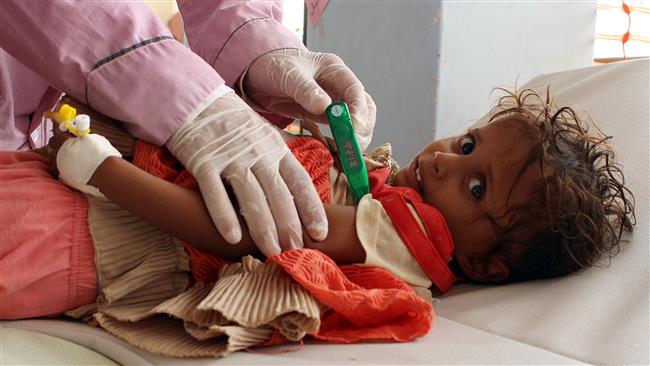
RNA - The executive directors of the World Health Organization (WHO), the UN Children's Fund (UNICEF) and the World Food Programme arrived in Yemen on Monday, visiting the war-wrecked southern province of Aden and the country’s capital Sana’a.
The UN representatives declined to elaborate on the visit, however, Yemen's official Saba news agency said the officials had met self-styled prime minister Ahmed bin Dagher for talks on international humanitarian aid, adding that the visit aimed to contain "the cholera epidemic which has spread to all provinces.”
The visit came a day after the UN warned that two thirds of Yemen's population was in dire need of humanitarian assistance and the country teetered on the edge of famine.
The WHO and the International Committee of the Red Cross (ICRC) also raised alarm that cholera outbreak had independently claimed 1,800 lives and infected more than 370,000 others in the war-torn country, with more than 600,000 Yemenis expected to contract cholera by December this year.
The World Food Programme had previously described the situation in Yemen as "the largest humanitarian crisis happening in the world at the moment."
Cholera is an acute diarrheal infection that is spread through contaminated food or water. It can be effectively treated with the immediate replacement of lost fluids and salts, but without treatment it can be fatal.
Cholera infection first became epidemic in Yemen last October and spread until December, when it dwindled. The second outbreak began in the Arabian Peninsula country in late April.
Meanwhile, nearly 3.3 million Yemeni people, including 2.1 million children, are currently suffering from acute malnutrition.
Since March 2015, Yemen has been under relentless airstrikes by Saudi fighter jets as part of a brutal campaign against the Arabian Peninsula country in an attempt to crush the Houthi Ansarullah movement and reinstall the former president, Abd Rabbuh Mansur Hadi, a staunch ally of Riyadh.
The campaign has seriously damaged the country's infrastructure. Local Yemeni sources have put the death toll from the Saudi war at over 12,000, including many women and children.
The US and the UK have been the main purveyors of weapons, training and intelligence to Saudis during the course of the unprovoked war.
847/940